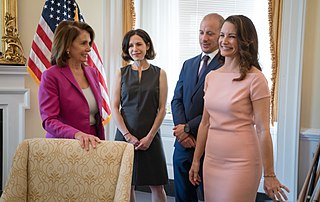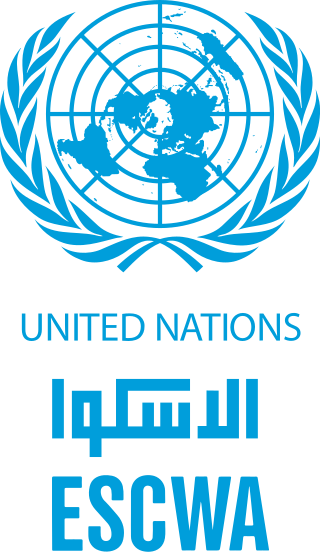
The Food and Agriculture Organization of the United Nations (FAO) is a specialized agency of the United Nations that leads international efforts to defeat hunger and improve nutrition and food security. Its Latin motto, fiat panis, translates to "let there be bread". It was founded on 16 October 1945.

The United Nations (UN) is an intergovernmental organization that aims to maintain international peace and security, develop friendly relations among nations and countries, achieve international cooperation, and serve as a centre for coordinating the actions of member states. It is widely recognized as the world's largest international organization. The UN is headquartered in New York City, in international territory with certain privileges extraterritorial to the United States, and the UN has other offices in Geneva, Nairobi, Vienna, and The Hague, where the International Court of Justice is headquartered at the Peace Palace.

The United Nations Economic and Social Council (ECOSOC) is one of six principal organs of the United Nations, responsible for coordinating the economic and social fields of the organization, specifically in regards to the fifteen specialized agencies, the eight functional commissions, and the five regional commissions under its jurisdiction.

The United Nations Environment Programme (UNEP) is responsible for coordinating responses to environmental issues within the United Nations system. It was established by Maurice Strong, its first director, after the United Nations Conference on the Human Environment in Stockholm in June 1972. Its mandate is to provide leadership, deliver science and develop solutions on a wide range of issues, including climate change, the management of marine and terrestrial ecosystems, and green economic development. The organization also develops international environmental agreements; publishes and promotes environmental science and helps national governments achieve environmental targets.

The World Food Programme (WFP) is an international organization within the United Nations that provides food assistance worldwide. It is the world's largest humanitarian organization and the leading provider of school meals. Founded in 1961, WFP is headquartered in Rome and has offices in 87 countries. In 2023 it supported over 152 million people, and it is present in more than 120 countries and territories.

The United Nations Population Fund (UNFPA), formerly the United Nations Fund for Population Activities, is a UN agency aimed at improving reproductive and maternal health worldwide. Its work includes developing national healthcare strategies and protocols, increasing access to birth control, and leading campaigns against child marriage, gender-based violence, obstetric fistula, and female genital mutilation.
The United Nations Development Programme (UNDP) is a United Nations agency tasked with helping countries eliminate poverty and achieve sustainable economic growth and human development. The UNDP emphasizes on developing local capacity towards long-term self-sufficiency and prosperity.

The United Nations System consists of the United Nations' six principal bodies, the specialized agencies and related organizations. The UN System includes subsidiary bodies such as the separately administered funds and programmes, research and training institutes, and other subsidiary entities. Some of these organizations predate the founding of the United Nations in 1945 and were inherited after the dissolution of the League of Nations.

Goodwill ambassador is a post-nominal honorific title, a professional occupation and/or authoritative designation that is assigned to a person who advocates for a specific cause or global issue on the basis of their notability such as a public figure, advocate or an authoritative expert. Sometimes the role of a goodwill ambassador is presented as "Ambassador" or "Goodwill Ambassador" preceding the first and last name, the titled name of the individual is always presented with an organizational, regional or national affiliation. Goodwill ambassadors generally deliver goodwill by promoting ideals or positions from one entity to another, or to a population to establish a benevolent relationship. A goodwill ambassador may be an individual from one country who resides in or travels to another country on a diplomatic mission at a peer to peer level. This can be country to country, state to state, city to city, or as an intermediate emissary representative of the people of a specific organization or cultural group, such as an indigenous tribe, marginalized people or enclave population.

The United Nations Economic and Social Commission for West Asia is one of five regional commissions under the jurisdiction of the United Nations Economic and Social Council. The role of the Commission is to promote economic and social development of Western Asia through regional and subregional cooperation and integration.

The Commission on Narcotic Drugs (CND) is one of the functional commissions of the United Nations' Economic and Social Council (ECOSOC), and is the central drug policy-making body within the United Nations System. The CND also has important mandates under the three international drug control conventions, alongside the three other treaty-mandated bodies: United Nations Office on Drugs and Crime, World Health Organization, and International Narcotics Control Board.

The World Maritime University(WMU), in Malmö, Sweden, is a postgraduate maritime university founded within the framework of the International Maritime Organization (IMO)—a specialized agency of the United Nations. Established by an IMO Assembly Resolution in 1983, the aim of WMU is to be the world centre of excellence in postgraduate maritime and oceans education, professional training and research, while building global capacity and promoting sustainable development.
The United Nations Sustainable Development Group (UNSDG), previously the United Nations Development Group (UNDG), is a group of 36 United Nations funds, programmes, specialized agencies, departments and offices that play a role in development. It was created by the secretary-general of the United Nations in order to improve the effectiveness of United Nations development activities at the country level.
UNICEF, originally the United Nations International Children's Emergency Fund, officially United Nations Children's Fund since 1953, is an agency of the United Nations responsible for providing humanitarian and developmental aid to children worldwide. The organization is one of the most widely known and visible social welfare entities globally, operating in 192 countries and territories. UNICEF's activities include providing immunizations and disease prevention, administering treatment for children and mothers with HIV, enhancing childhood and maternal nutrition, improving sanitation, promoting education, and providing emergency relief in response to disasters.
The Republic of the Philippines and the United Nations have been affiliated since the conception of the organization. The then Commonwealth of the Philippines was one of the signatories of the 1942 UN Declaration, from which the U.N. Charter of 1945 was based on. The Philippines was also among the 51 original member states, and one of only four Asian nations, that signed this charter, which marked the beginning of the UN operations.
The Water Supply and Sanitation Collaborative Council (WSSCC) was a United Nations-hosted organization contributing to Sustainable Development Goal 6, Target 6.2 on sanitation and hygiene. It was established in 1990 and closed at the end of 2020. WSSCC advocated for improved sanitation and hygiene, with a focus on the needs of women, girls and people in vulnerable situations.

The Secretary-General's Envoy on Youth serves as a global advocate for addressing the needs and rights of young people for bringing the United Nations closer to them. The Envoy's Office is part of the United Nations Secretariat and supports multi-stakeholder partnerships related to the United Nations system-wide action plan on youth to volunteer initiatives. The office also promotes the empowerment and foster the leadership of youth at the national, regional, and global levels, including through exploring and encourages mechanisms for young people’s participation in the work of the United Nations and in political and economic processes with a special focus on the most marginalized and vulnerable youth.
Monitoring and Evaluation (M&E) is a combined term for the processes set up by organizations such as companies, government agencies, international organisations and NGOs, with the goal of improving their management of outputs, outcomes and impact. Monitoring includes the continuous assessment of programmes based on early detailed information on the progress or delay of the ongoing assessed activities. Evaluation involves the examination of the relevance, effectiveness, efficiency and impact of activities in the light of specified objectives.

Armenia was admitted into the United Nations on 2 March 1992, following its independence from the Soviet Union. In December 1992, the UN opened its first office in Yerevan. Since then, Armenia has signed and ratified several international treaties. There are 20 specialized agencies, programs, and funds operating in the country under the supervision of the UN Resident Coordinator. Armenia strengthened its relations with the UN by cooperating with various UN agencies and bodies such as the International Monetary Fund, the World Bank, the World Food Programme, and with the financial institutions of the UN. Armenia is a candidate to preside as a non-permanent member of the UN Security Council in 2031.










